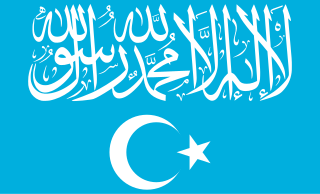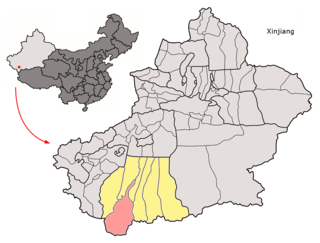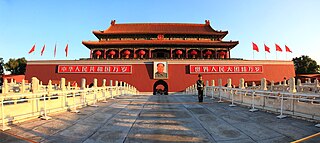 W
WThe Turkistan Islamic Party (TIP) or Turkistan Islamic Movement (TIM), formerly known as the East Turkestan Islamic Movement (ETIM) and other names, is an Islamic extremist organization founded by Uyghur jihadists in Western China, considered broadly as a terrorist group. Its stated goals are to establish an independent state called East Turkestan replacing Xinjiang. According to a Chinese report, published in 2002, between 1990 and 2001 the ETIM had committed over 200 acts of terrorism, resulting in at least 162 deaths and over 440 injuries. The UN Security Council Al-Qaida Sanctions Committee has listed ETIM as a terrorist organization since 2002.
 W
WThe 2011 Hotan attack was a bomb-and-knife attack that occurred in Hotan, Xinjiang, China on July 18, 2011. According to witnesses, the assailants were a group of 18 young Uyghur men who opposed the local government's campaign against the burqa, which had grown popular among older Hotan women in 2009 but were also used in a series of violent crimes. The men occupied a police station on Nuerbage Street at noon, killing two security guards with knives and bombs and taking eight hostages. The attackers then yelled religious slogans, including ones associated with Jihadism, as they replaced the Chinese flag on top of a police station with another flag, the identity of which is disputed.
 W
WThe 2008 Kashgar attack occurred on the morning of 4 August 2008 in the city of Kashgar in the Western Chinese province of Xinjiang. According to Chinese government sources, it was a terrorist attack perpetrated by two men with suspected ties to the Uyghur separatist movement. The men reportedly drove a truck into a group of approximately 70 jogging police officers, and proceeded to attack them with grenades and machetes, resulting in the death of sixteen officers. Foreign tourists who witnessed the scene provided a divergent account of events, saying that the attackers appeared to be machete-wielding paramilitary officers.
 W
WThe 2011 Kashgar attacks were a series of knife and bomb attacks in Kashgar, Xinjiang, China on July 30 and 31, 2011. On July 30, two Uyghur men hijacked a truck, killed its driver, and drove into a crowd of pedestrians. They got out of the truck and stabbed six people to death and injured 27 others. One of the attackers was killed by the crowd; the other was brought into custody. On July 31, a chain of two explosions started a fire at a downtown restaurant. A group of armed Uyghur men killed two people inside of the restaurant and four people outside, injuring 15 other people. Police shot five suspects dead, detained four, and killed two others who initially escaped arrest.
 W
WInside the Kunming railway station in Kunming, Yunnan, China at around 21:20 on 1 March 2014, a group of knife-wielding terrorists attacked passengers at the city's railway station. Both male and female attackers pulled out long-bladed knives and stabbed and slashed innocent passengers. Four assailants were shot to death by police on the spot and one injured female perpetrator was captured. The assailants killed 31 civilians with injuring more than 140 people. On 3 March, police announced that the six-man, two-woman group had been neutralized after the arrest of three remaining suspects.
 W
WAbdul Shakoor al-Turkistani, also known as Abdul Shakoor Damla and Emeti Yakuf, was the emir of the East Turkistan Islamic Party, an Islamist organisation that seeks independence for China's Xinjiang province and for it to become an Islamic state. In August 2011, Adbul Shakoor reportedly appeared in a video with his face obscured taking responsibility for the 2011 Kashgar attacks and 2011 Hotan attack.
 W
WOn 28 October 2013, a car crashed in Tiananmen Square, Beijing, China, in a terrorist suicide attack. Five people died in the incident; three inside the vehicle and two others nearby. Police identified the driver as Usmen Hasan and the two passengers as his wife, Gulkiz Gini, and his mother, Kuwanhan Reyim. An additional 38 people were injured.
 W
WThe Turkistan Islamic Party in Syria is the Syrian branch of the Turkistan Islamic Party, an armed Uyghur Salafist jihadist group with a presence in the Syrian Civil War. While the TIP has been active in Syria, the organization's core leadership is based in Afghanistan and Pakistan, with a presence in its home territory of China.
 W
WAbu Omar al-Turkistani was a high-ranking commander for several al-Qaeda-affiliated groups, such as the Islamic Jihad Union (IJU), the Al-Nusra Front and the Turkistan Islamic Party in Syria (TIP). Active as a militant since at least 2001, al-Turkistani fought in both the War in Afghanistan and the Syrian Civil War. By late 2016, he was considered to be "one of top ten leading 'jihadists' in Syria" and one of the "four most prominent leaders" of TIP. Shortly before his death, al-Turkistani helped to facilitate the merger of many Islamist rebel groups into Tahrir al-Sham. He was eventually killed by an American drone strike on 1 January 2017.
 W
WOn 30 April 2014, a knife attack and bombing occurred in the Chinese city of Ürümqi, Xinjiang. The incident, a terrorist attack, left three people dead and seventy-nine others injured. The attack coincided with the conclusion of a visit by Xi Jinping, General Secretary of the Communist Party of China to the region.